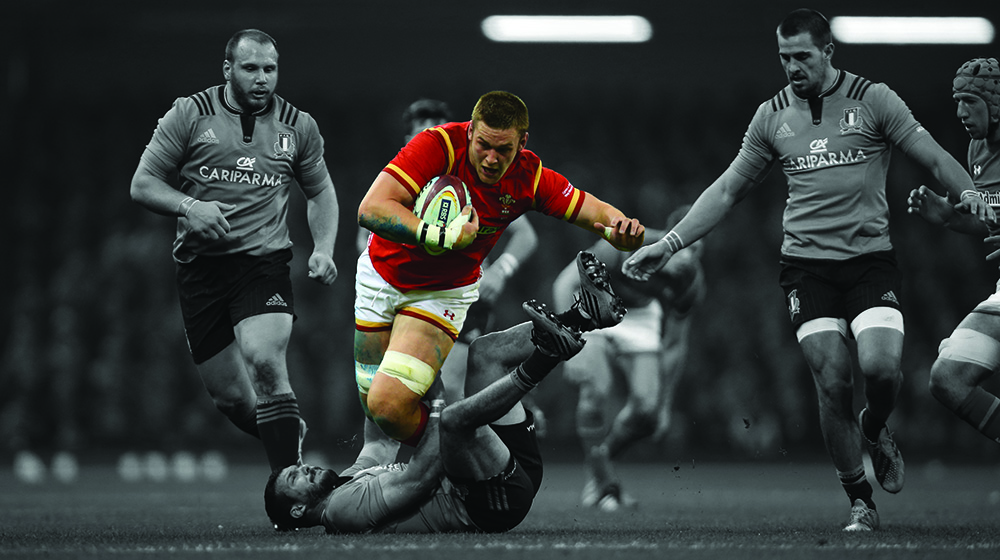What You Can Learn From The Welsh Rugby Team’s Training
Upgrade your own performance – on and off the field – with lessons from Wales’s elite players
International rugby demands a unique mix of speed, strength, power and lean muscle, alongside the ability to take a hit and recover fast. Ahead of the Six Nations, Coach’s sister publication Men’s Fitness speaks with members and staff of the Welsh national team to help you stay on top form.
It's all about working on your mental strength, sorting out your nutrition and recovering like a pro to avoid injuries before they happen. You can also give this strength and conditioning rugby workout a go, and check out these leftfield approaches to rugby training from England rugby
Strengthen Your Mental Game

Elite-level performance starts in the mind. Up your game with advice from Wales and Lions flanker Dan Lydiate
Have A Routine
According to a 2006 study from Duke University in the US, 40% of your daily actions are habits, not decisions – so make them good ones. “I have the same routine before every game – getting strapped, getting limber,” says Lydiate. “When you start your career as a player you don’t have a routine, but then when you find things that work well – stretches or mental warm-ups, even a song you always listen to – you keep them in place.” Keeping to a regular morning routine – even if it’s just coffee, to-do list, stretch – automates good behaviour and makes it mindless.
Move On From Mistakes
“Mistakes will always happen in a game,” says Lydiate. “But once it’s happened, you can’t do anything about it. Focus on the positive and move on to the next thing as soon as possible. As long as you try to learn and improve as a player, you’ll do better.” Once you’ve done everything you can in the moment to fix things, forget it and move on – the mistake is officially over, even if you have to carry on dealing with the consequences.
Take Time To Assess
“Most nights I have a good stretch, which is my time to reflect on the day’s work,” says Lydiate. “We have apps that let us watch the week’s training, and I’ll have my notebook there to jot down things that worked or didn’t, things I need to work on. My role in the games changes from week to week as well, so I’ll jot that down – you don’t have the same moves, set moves every week. It’s about having a reminder there.” Whether you’re focused on the gym or your job, scribble down something you did well and an area for improvement each night before bed – and remember to refer back to it.
Use What Works
Eye-bulging pump-up speeches or cold, hard logic? “We use both, to be honest,” says Lydiate. “A lot of players like to be shouted at, but a lot of players like to keep in their heads, get on their headphones or just sit in silence. It’s quite individual even though it’s a team sport, and the best captains know when it’s time to scream and shout, and when it’s time to focus on details.” Studies suggest that overexposure to stimuli can actually lead to a reduced response – it’s known as “habituation” – so save the adrenaline-pumping music for important events.
Get the Coach Newsletter
Sign up for workout ideas, training advice, reviews of the latest gear and more.
Rise To The Occasion
Some commentators suggest that the All Blacks’ haka – the traditional war dance performed before pivotal matches - gives the New Zealand team an unfair advantage. Know who disagrees? The players. “As a player, the haka is one of rugby’s great spectacles,” says Lydiate. “It’s not a daunting thing when you’re facing it. It gets you motivated.” When circumstances are daunting, remind yourself that you’ve trained for this moment, and that all you’ve got control over is your own actions.
Get Nutrition Right
All Wales rugby players are taught to eat better – and smarter – so they can take care of themselves, explains national team nutritionist Jon Williams. Here’s your five-minute study pack:
Keep It Simple
“At every meal, we’re looking at a portion of protein, a portion of carbs, a portion of vegetables,” says Williams. “That means even if they’re having porridge for breakfast, they’ll put in berries, protein, nuts and seeds – and it’s coconut milk if they’re having it pre-match because it’s easier to digest and a slightly better source of MCTs (medium-chain triglycerides) for energy. Lunch might be salmon and salad, dinner might be chicken and veg. Stick to those principles, and get a range of colours in your veg for a mix of antioxidants.”
RECOMMENDED: How to Bulk up Like Sam Warburton
Learn To Cook
“When the boys first come into the academy they learn the basics,” says Williams. “It’s about quick, easy options: how to make an omelette, scrambled eggs, a chilli.” The Wales-approved omelette recipe is four eggs, a handful of spinach, some chopped chorizo, mushrooms and pepper, and a sprinkling of cheese. Scale it down if necessary: the senior Wales players aim for 250-300g of protein a day.
RECOMMENDED: Healthy Chilli Con Carne Recipe
Supplement Smart
“Apart from protein, our guys will have an amino acid electrolyte blend when they first get up, then a high-quality multivitamin and a prebiotic for digestion,” says Williams. “They’ll also take vitamin D – we test their blood levels to make sure they’re topped up from October right through to April. The dose is 4,000IU a day, although in the summer they might cut that down.”
RECOMMENDED: The Best Supplements
Curb The Post-Match Excess
If you’re going to celebrate, lay the groundwork first. “After a game we give our guys a recovery smoothie with berries, milk and honey,” says Williams. “Then they have fish goujons or cottage pie, or maybe steak burger with sweet potato fries. After that, they can do what they want. Some teams say, ‘as soon as the game’s done, have what you want’ but we’re like, ‘if you eat the good stuff, you can have the other stuff’.”
Recover Like A Champ
You can’t win if you don’t show up. Make sure you’re in the game every week by recovering fast and stopping injuries before they start.
Pack On Armour
Remember, you aren’t building muscle just for show. “We do a lot of back squats, but it’s not just about getting strong – it’s about strengthening the muscles around the area and making the guys resilient to injury,” says Huw Bennett, a former Wales international who’s now a strength and conditioning coach for the team. “It’s about making sure the guys don’t break up. We’ll do unilateral work too – single-leg moves to make their mechanics more efficient and make them less injury-prone.”
Keep Your Calves Fresh
“They’re the muscle where the guys accumulate a lot of tissue build-up from running,” says John Ashby, another member of the Wales S&C team. “We’ll get them doing dynamic stretching pre-game, then static stretching and foam rolling post game.” Get a roller for your calves and do five to ten rolls on each calf after every legs workout. You’ll reap the mobility benefits.
And Remember To Sleep
“We talk about ‘sleep hygiene’ with the players a lot,” says sports scientist Ryan Chambers. “Staying off the tea and coffee for six hours before bed, investing in some blackout blinds, getting a good-quality mattress. We’ve looked at research about night owls vs morning larks and when people perform best – there’s not much you can do about it on a rugby schedule, but you can experiment with working out at different times and keeping track of your energy levels to see what works.”

Under Armour athletes Rhys Webb and Dan Lydiate were speaking during the launch of the inaugural Under Armour Series, which showcased how they manage their training using UA RECORD™ app. To find out more visit record.underarmour.com.
From 2008 to 2018, Joel worked for Men's Fitness, which predated, and then shared a website with, Coach. Though he spent years running the hills of Bath, he’s since ditched his trainers for a succession of Converse high-tops, since they’re better suited to his love of pulling vans, lifting cars, and hefting logs in a succession of strongman competitions.

